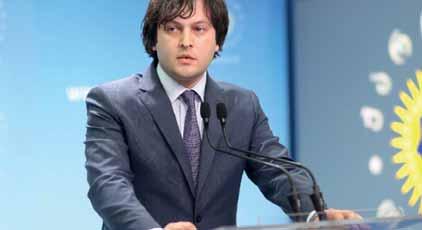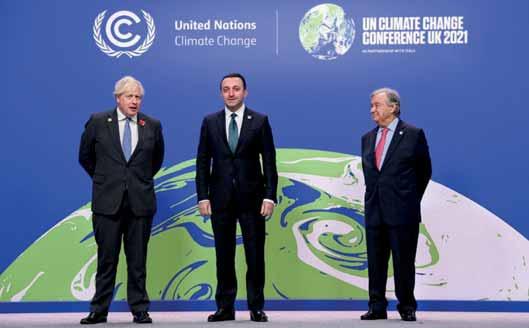
16 minute read
NEWS
from Issue #1321
COVID: New Cases & Fatalities Up, President Urges Mandatory Vaccination for Risk Groups
BY TEAM GT
Advertisement
The epidemiological situation in Georgia remains concerning. Against the background of a very low vaccination rate, the recent elections and reactions to the results have led to mass gatherings of people becoming frequent, which further complicates the situation, even raising concerns that it might become uncontrollable in the near future.
At a special briefi ng held on Wednesday, President Salome Zurabishvili called on authorities to implement mandatory vaccination for high-risk groups, for Covid certifi cates to be a requirement in public areas, and for coronavirus treatment to be charged for if the patient is unvaccinated.
Following a meeting with the CatholicosPatriarch, she further called on the Georgian Orthodox Church to promote mass vaccination for parishioners and suppress anti-vaccine campaigning by some priests.
“I appeal to the government to take urgent and strict measures - mandatory vaccination for risk groups, introduction of a Covid passport for entering public spaces and even paid treatment for nonvaccinated people,” Zurabishvili said.
She also attended the sitting of the Coordination Council working on Covid issues on Thursday. The discussion lasted two hours.
THE VACCINE
Health experts have also expressed concerns about the current situation.
Speaking of the vaccination, Deputy Health Minister Tamar Gabunia said offering a universal booster jab is under discussion. Under the current rule, only people over 50 are eligible for a booster jab six months after their second vaccination.
On Thursday, head of the National Center for Disease Control, Amiran Gamkrelidze, spoke at a briefi ng about the effectiveness of the vaccine and presented an analysis of the March-September data of Georgia.
“In vaccinated individuals, the effectiveness of vaccine protection is 90%. The chance of infection in fully vaccinated persons is 9.87 less than in unvaccinated individuals. During this period, as of September 30, 814,851 people were fully vaccinated in the country, of which 11,403 were infected with Covid,” Gamkrelidze said.
He noted that a total of 53,767 people had been hospitalized in the country since March 15, and 1386 needed hospitalization after vaccination. The effectiveness of vaccination in terms of protection from hospitalization is 93.4%.
The need for intensive care in the fully vaccinated age group over 60 is 97.5% lower than in the unvaccinated, while the population aged 18-59 is said to be 99% protected from intensive care.
As for protection against lethality, a total of 5,469 people died in the country between March 15 and September 30. 98.95% of them were unvaccinated. In the 18-59 age group, in the case of fully vaccinated, mortality protection is 99.37%, while in the 60 and 60+ age groups, it is 97.8%.
The data includes all the vaccines available in the country.
THE STATISTICS
Based on the current week’s Covid statistics, most of the new cases are being detected in Tbilisi, which is followed by the Imereti and Kakheti regions.
The country recorded 5553 coronavirus cases, 4223 recoveries, and 47 deaths on Tuesday. Georgian capital Tbilisi recorded the highest number of 1794 Covid-19 cases within 24 hours, followed by the Imereti region with 1189 cases, and the Kakheti region with 657 cases.
The country reported 6024 coronavirus cases, 3818 recoveries, and 49 deaths on Wednesday. Tbilisi recorded 2237 Covid19 cases, followed by Imereti with 1148 cases and Kakheti with 553 cases.
On Thursday, Georgia reported 5206 coronavirus cases, 4648 recoveries, and 53 deaths. Tbilisi recorded the highest number of 1885 Covid-19 cases within 24 hours, followed by the Imereti region with 979 cases, and the Kakheti region with 530 cases.
The daily test-positivity rate now stands at 10.71 %.
Georgia’s total case tally since the fi rst case appeared in the country in February 2020, this week reached 738,171, among which 678,288 people recovered and 10,238 died.
As of November 4, 1,990.501 people in Georgia have received a Covid-19 vaccine, averaging around 3469 jabs a day.
THE CASES WORLDWIDE
The global COVID death toll hit 5 million this week.
The US, Brazil, India, Mexico and the UK account for over half of deaths in the Johns Hopkins University tally, The Guardian reports.
In the Asia-Pacifi c region, the World Health Organization granted an emergency use license Wednesday to a coronavirus vaccine developed in India. The UN health agency said in a statement that it had authorized Covaxin, made by India's Bharat Biotech. That makes Covaxin the eighth Covid-19 vaccine to receive WHO's green light. Covaxin was given emergencyuse authorization in India in January even before the completion of its late-stage trial, which later found the shot to be 78% effective against severe Covid-19. The vaccine is made using a an inactivated SARS-CoV-2 antigen to prompt an immune response, and is given in two doses.
RUSSIA
The situation is particularly alarming in Georgia’s neighboring country Russia. Vladimir Putin has said Russia may need the army’s help to build fi eld hospitals for Covid patients, as offi cials battle rampant outbreaks that have led to a nationwide workplace shutdown, Reuters reports.
His remarks came as Russia reported 40,993 new Covid infections, its highest single-day case tally since the start of the pandemic.
EUROPE
In its weekly report on the pandemic, the UN health agency said new cases jumped by 6% in Europe for the week of Oct. 25 to 31, compared to an 18% increase the previous week. The weekly number of new infections in other regions either fell or remained about the same, the report said.
While the Czech Republic, Poland and other countries in Central and Eastern Europe have reported recent infection spikes, the continuing rise in confi rmed cases across Europe has been driven mostly by: • The United Kingdom, with 285,028 new cases — a 14% decrease from a week earlier. • Russia, with 272,147 new cases — a 9% increase. • Turkey, with 182,027 new cases — an 8% decrease.
The highest number of deaths in the region were reported in: • Russia, with 7,938 reported deaths — a 9% increase. • Ukraine, with 3,857 reported deaths — a 19% increase. • Romania, with 3,072 deaths — a 6% increase.
UKRAINE
“Several hundred people blocked traffi c in the center of the Ukrainian capital of Kyiv on Wednesday in a protest against coronavirus restrictions and mandatory vaccinations which the government introduced to curb new infections. Vaccines have become mandatory for some state workers, and, in "red" zone areas, including Kyiv, only vaccinated people or those with negative Covid-19 test results are allowed into restaurants, gyms and on public transport,” reported the CBC News.
The Local Self-Government Elections in Georgia
Continued from page 1
The united opposition said it did not recognize the results of the second round of elections, claiming the GD falsifi ed the results, and called on their supporters to gather on 31 October in front of the Parliament building, where the opposition leaders presented their plan to hold a rally in Tbilisi on November 6.
According to Tbilisi mayoral candidate Nika Melia, in parallel with the rallies, they will appeal all election violations in the districts and then in the courts in order to go through full legal procedures. As Melia says, the aim is to show the country’s Western partners that holding rallies is not the will and aim of the opposition, but are necessary due to the current situation.
EU Ambassador Carl Hartzell, in coordination with EU Heads of Mission, released a statement saying: “Following the fi rst round, we stated that the reported malpractices must not become a norm in Georgia. We deplore that these elections have been a missed opportunity in this respect. Despite a clear assessment by the international observers, meaningful steps were not taken to address key shortcomings. On the contrary, further shortcomings have emerged, especially in terms of misuse of administrative resources and violent rhetoric by Georgia’s political leaders, further fueling an already deep political polarization. Suggestions made before these elections that the central government would not cooperate with local councils, should they swing towards another majority, are of concern as they seek to restrict the electorate’s choice and to limit pluralism.
“We call on all parties to stay engaged in the electoral process. Public trust in its integrity requires an inclusive, credible, and transparent recounting process and fair adjudication of complaints and appeals. In this regard, the Central Election Commission and the courts have a key responsibility in the days ahead,” Hartzell wrote.
Former president of Georgia, Mikheil Saakashvili, assessed the local self-government elections and stated: “I am very angry and insulted, as all self-respecting Georgians should be. We had the elections stolen from us in every big city. We won this election and the group of bandits who usurped the Georgian government snatched this victory from us. They robbed us and deprived us of our most basic right to be the masters of our own country.”
Several opposition MPs in the week following the election renounced their parliamentary mandates in protest at the results. Lelo for Georgia party leader Mamuka Khazaradze was the fi rst to leave parliament following the announcement of election results. Saakashvili assessed his move as “very impressive” and called on other opposition MPs to follow his example.
“My advice would be for the patriots of this nation and my comrades to do as Mr. Khazaradze did and to leave the parliament and leave the ‘Dream’ alone with itself,” read his message from Rustavi prison.
Other MPs who refused their mandates are UNM members Levan Varshalomidze, Ani Tsitlidze, and Nona Mamulashvili, Tako Charkviani, and Girchi-More Freedom leader Zura Japaridze. Other opposition MPs are expected to follow their example. MP Elene Khoshtaria went on a hunger strike in parliament Thursday, saying "I will continue my hunger strike until Mikheil Saakashvili is taken to a civil clinic. I choose a peaceful protest. Other members of the opposition have different forms." Earlier in July, UNM Chairman Nika Melia renounced his mandate as he prepared for his mayoral candidacy.
Chairman of the Georgian Dream Irakli Kobakhidze states the ruling party convincingly won the local elections. “The most problematic aspect of this election, which all international observers noted, was the very high degree of polarization and the highly polarized media environment. It is our duty to change this situation qualitatively before the next elections. I believe this was the last polarized election in Georgia, and the next, 2024 parliamentary elections, will be held in a much healthier environment, amid a healthy political debate around election programs,” Kobakhidze said.
The US Embassy in Georgia released a statement on the second round of elections, noting that they share the Offi ce for Democratic Institutions and Human Rights’ (ODIHR) assessment that the elections were generally calm and welladministered.
“We share ODIHR’s assessment that the elections were generally calm and well-administered, but allegations of intimidation and pressure on voters persisted, and continued polarization, coupled with the escalation of negative rhetoric, adversely affected the process. Sharp imbalances of resources and the undue advantage of incumbency further tilted the playing fi eld. ODIHR also noted concerns with the persistent practice of representatives of observer organizations acting as party supporters, at times interfering with the process, and groups of individuals potentially infl uencing voters outside some polling stations. While ODIHR found that the CEC organ-
Image source: reginfo.ge ized the second round in a professional and transparent manner, concerns over the impartiality of the lower-level election commissions persisted. US Embassy election observation teams witnessed similar interference and bias at several precincts.
“As these elections have shown, democracy is a work in progress. It requires dedication to the highest international standards and vigilance to ensure citizens’ rights and freedoms are protected. Some of the reforms enacted by Georgia’s political leaders through an inclusive, multiparty process earlier this year, such as automatic recounts and electronic vote counting, largely succeeded in increasing the transparency of the voting process,” reads the US Embassy statement.
The winner of the Tbilisi election for mayor, Kakha Kaladze, thanked all the people who trusted and voted for him.
“The main principle for me is that I am a mayor for absolutely everyone. I have stated several times that for me Tbilisi is not divided into my own and other people’s. This approach has not existed since 2017 and so I plan to continue my work this way. I will be a mayor for everyone and I am ready to use the enthusiasm, energy, knowledge, and experience of each person to make Tbilisi the greenest, most comfortable, healthy, and orderly city. To achieve these goals, the involvement and activity of every Tbilisian is needed,” Kaladze said.

NOVEMBER 5 - 11, 2021 POLITICS
3 Georgia - One of 120 Countries Showing an Interest in Battling Climate Change

Prime Minister of Georgia Irakli Garibashvili with (left) UK Prime Minister Boris Johnson and (right) SecretaryGeneral of the United Nations António Guterres, at COP26
BY TEAM GT
The Prime Minister of Georgia, Irakli Garibashvili, published a post on his Facebook page thanking the Prime Minister of the United Kingdom, Boris Johnson, and the Secretary-General of the United Nations, António Guterres, for their efforts, in spite of pandemic, to bring more than 120 world leaders together for the climate this week.
“I had the honor to participate on behalf of Georgia in the 26th UN Summit of World Leaders on Climate Change 2021, held in Glasgow,” the PM wrote. “I thank the Prime Minister of the United Kingdom, Boris Johnson, and the Secretary-General of the United Nations, António Guterres, for their efforts to bring together more than 120 world leaders in the wake of the pandemic.
“Climate change is a global challenge that cannot be tackled without joint efforts. We owe it to ourselves to work together,” the post reads.
He participated in the 26th United Nations Climate Change Conference (COP26) held on November 1-2 in Glasgow, along with other world leaders, who over the two days agreed on two important advances on climate change, promising to curb methane emissions by 30% by 2030, and agreeing on a deal to end deforestation by 2030.
A total of over 100 countries have now joined the US and EU’s ‘Global Methane Pledge’ to cut methane emissions by 30% by 2030.
Methane is a strong greenhouse gas which has higher heat trapping potential than carbon dioxide. Methane takes 20 years to break down, as opposed to hundreds of years for the number one greenhouse gas, carbon dioxide, which means that cutting methane emissions can have a rapid impact on global warming. If met, the pledge could prevent 0.2 degrees of warming by mid-century, which in turn fulfi ls the 2015 Paris climate Agreement. China, Russia, and India did not sign the pledge, although they are among the top fi ve methane emitters. Skepticism remains high as to transparency and accountability, however, as members of the alliance are not required to set individual targets for reducing their emissions.
Further results this week saw over 100 world leaders promising to end and reverse deforestation by 2030. Countries such as Canada, Russia, Brazil, Indonesia, and many more will endorse the Glasgow Leaders’ Declaration on Forest and Land Use. Together, they account for 85% of the world’s forests. Brazil, now infamous for the huge loss of stretches of the Amazon rainforest, was among the signatories on Tuesday.
Deforestation contributes to climate change because it reduces the number of trees absorbing the greenhouse gas carbon dioxide. 28 governments also committed to removing deforestation from the global trade of food and other agricultural products, such as palm oil, soya and cocoa. These industries impact forest loss by cutting down trees to make space for animals to graze or crops to grow.
The deforestation reduction pledge includes almost $19.2bn of public and private funds, some of which will go to developing countries to restore damaged land, tackle wildfi res and support indigenous communities.
Mane experts welcomed the pledge, but warned the last deal made in 2014 had failed to slow deforestation at all. It is also uncertain how governments would be held accountable, as, although national laws would be needed to guarantee the agreement is upheld, none have yet been announced.
“Delegates on Wednesday focused on how to get private fi nance working with public sector funding to boost global investment and nature-positive technology, innovation, and infrastructure projects in a bid to ensure Climate Change funding and adaptation,” impakter.com reported. “More than 30 of the world's biggest fi nancial companies, including Aviva, Schroders and Axa, have also promised to end investment in activities linked to deforestation. And a $1.5bn fund will be established to protect the world's second largest tropical rainforest - in the Congo Basin.”
A survey conducted by the Regional Environmental Center for the Caucasus within the EU4Climate program implemented by the UN Development Program in Armenia, Azerbaijan, Belarus, Georgia, Moldova and Ukraine, found the following results in Georgia last year: • 97.6% of respondents have heard about climate change. • 91.35% think that climate change is real and poses threats to humanity. • 25.9% of Georgia’s population believe that international organizations will be able to manage the consequences of climate change. • The majority of respondents think that climate change is more important than international terrorism and armed confl icts (57.9%). • 36.19% believe they can do nothing to tackle climate change (among them, women: 41.4%, men: 30.1%). • Global warming and draughts (96.11%), disasters (92.84%), melting glaciers and warming ocean (91.83%) are considered as negative effects of climate change. • 86.7% of Georgia’s population are aware that energy effi ciency measures can reduce their monthly expenses, and 7.9% believes that energy effi ciency measures do not affect their monthly expenses.
The data was collected by face-to-face interviews with 1100 respondents in urban and rural settlements across the country in August and September 2020.
Opera Soloist Giorgi Todua On a Dream of Returning to His Home in Abkhazia

Image source: eurasia.net
INTERVIEW BY GISP

It is my homeland I came back to, and not the ‘Republic of Abkhazia’, said Mariinsky Opera House soloist Giorgi Todua after a concert in occupied Gali in 2018. Since then, Todua has not been able to return to his homeland - after he spoke those words to Georgian media outlet LivePress, and gave clear answers to several of their questions, the de facto government of Sokhumi named the incident a provocation.
Giorgi's concert in Gali was his father's dream, and he dedicated it to his father, calling the performance: “Father, I'm back home.” The opera singer says that under the agreement, there should have been no talk of politics that day, but sometimes “there comes a time when specifi c questions need to be answered.”
Todua spoke to Gisp.ge about whether he hopes to return to Gali again, how he remembers the scandalous concert of his father’s dreams, and what he sees as the key to resolving the situation between Abkhazians and Georgians.
YOU HAVE NOT BEEN BACK TO GALI, YOUR CHILDHOOD HOME, FOR THREE YEARS. HOW DO YOU FEEL ABOUT THAT AND DO YOU HOPE TO BE ABLE TO GO BACK AGAIN?
Of course, I hope so – hope has lived on since my childhood, since the moment we left Abkhazia. I think we’ll go back to our native land and stay there. Of course, it’s diffi cult when you can’t get to your own home, nor see your relatives. I expect that feeling is the same for all Georgians. Continued on page 6






